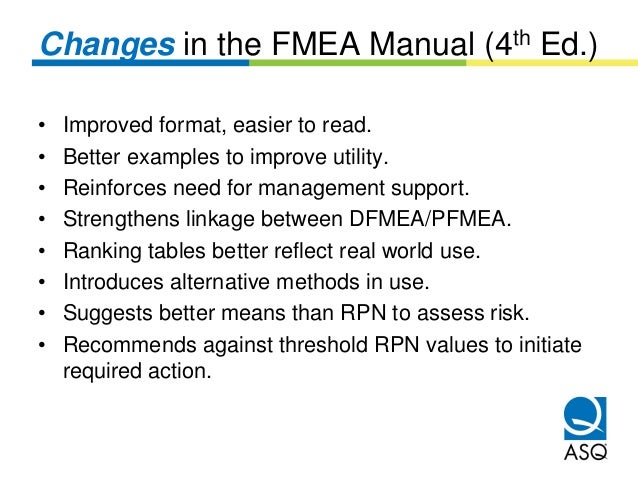Aiag Fmea 4th Edition

. AIAG & VDA FMEA: Essentials for Transitioning - eLearning“What do I need to know to transition from AIAG FMEA 4th Edition to the new AIAG & VDA FMEA Handbook?”Beyond asking you to adapt to the new/changed columns in the form, the AIAG & VDA FMEA Handbook calls for a more clear, true, realistic, and complete approach to structure, function, and failure analysis; it drives implementation teams to consider each focus element in the context of its overarching system/application, and to take a 360-degree view of potential failures including all interfaces and characteristics.
The new seven-step approach starts with robust FMEA project planning and ends with a concise report-out to top management and other interested parties that facilitates communication and further action.This eLearning course provides you with a clear understanding of the principles and values driving the new approach; it includes the warning signs of a poor approach and specific calls-to-action from the new Handbook. This Essentials for Transitioning training does not cover every minor change in detail but instead focuses on the major action areas key to any project that follows the new FMEA methodology. You will leave the course recognizing the potential weaknesses within your organization and how the Handbook helps you improve your approach.


Aiag Fmea
Learning Objectives. Recognize the principles behind the new FMEA methodology. Recognize the warning signs of a bad approach.
Fmea 5th Edition Manual Pdf
Understand the root causes of these warning signs and how to shift your approach. Understand the intentions and principles behind the directions in the new FMEA Handbook (including major changes to the FMEA forms). Understand how the changes in the new FMEA Handbook tie to overall organizational success. Evaluate the weaknesses within your own team/organization and be ready to take the next step. Agenda.
Why did the FMEA change?. Tally 6.3 old version. Major action areas. Establishing an appropriate FMEA program.
Performing an accurate and comprehensive system analysis. Determining the realistic risk profile of the product/process. Maintaining FMEA as a 'living document'. Summarizing results and communicating with stakeholders.
Using Foundation/Family FMEAs effectively. Leveraging FMEA within the supply chain. Overview of the FMEA Handbook's 7 Steps and forms. Aligning technical risk analysis with business objectives. Next Steps.